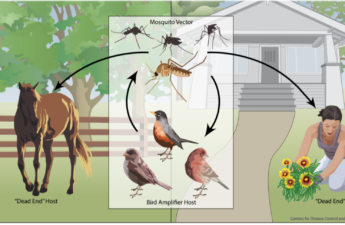DOH took the samples Aug. 14 and shared test results with Tacoma-Pierce County Health Department late last week.
“People should assume West Nile Virus infection is possible in Pierce County and take steps to prevent breeding mosquitoes and avoid mosquito bites,” said Nigel Turner, director of the Communicable Disease division. “Most importantly, know when to get care if you have been bitten,” he said.
Who’s most at risk for West Nile Virus?
Most people exposed don’t get sick, but it only takes one bite to acquire the virus form an infected mosquito. But less than 1 percent of people infected with the virus will develop severe illness. Some are at higher risk of severe disease, including people 60 years old or older, those with compromised immune systems or underlying medical conditions.
What are the symptoms?
Symptoms of West Nile virus include headache, fever, muscle and joint aches, swollen lymph nodes and a rash. Symptoms usually develop 2 to 14 days after an infected mosquito bites you. Those with more severe symptoms—such as severe headache, stiff neck or confusion—should seek medical attention.
Health officials have not seen any cases of West Nile virus in Pierce County among people, birds or horses. West Nile activity typically shows up early to mid-August. People should take steps to control mosquito populations and prevent exposure to bites.
Drain, dress and repel.
You can take simple steps to avoid mosquito bites and reduce mosquito breeding sites around your home.
- Drain and routinely empty anything that holds water, like gutters, pet bowls, tires, bird baths at least twice a week. Keep water moving in ornamental ponds by recirculating water or by installing a fountain.
- Dress in long-sleeved shirts and long pants, especially at dawn and dusk when mosquitoes are most active.
- If outdoors, use mosquito repellent where mosquitoes are active.
- Use properly fitted door and window screens and stay indoors around dawn and dusk.
West Nile Virus in Pierce County
In 2018, the Gog-le-hi-te site was DOH’s only sampling site in Pierce County, and Tacoma-Pierce County Health Department cut its zoonotic program in 2010 because of decreased funding. Because of this recent detection, the Health Department will temporarily set up and monitor five additional sampling sites at geographically diverse locations around the county. The Health Department will explore funding options for ongoing testing.
In Pierce County, we have seen West Nile Virus in birds in 2002, 2008 and 2009, and 2 people were positive for the virus in 2006.
“Even though it shows up sporadically, we believe increased testing would likely reveal more cases of West Nile virus,” said Turner.
DOH’s maps and statistics show where West Nile virus is elsewhere in the state. Last year, nearly every state and the District of Columbia reported West Nile virus infections in people, birds or mosquitoes. This year, Washington has seen no human WNV cases. Nationally, 231 people have had the virus and 8 have died from it.
No vaccine is available for humans, but there is one for horses. About 1 in 3 horses that become ill with the virus will die. One horse in the state had a confirmed case of WNV in 2018, in Grant County. Talk to your equine veterinarian if you have questions about the West Nile virus vaccine. Get more information at the WSDA website.
If you find a dead bird, be aware some birds may die from West Nile virus. Don’t handle dead birds with your bare hands. Find information about dead birds, West Nile virus prevention and mosquito repellents at www.tpchd.org/westnile.
